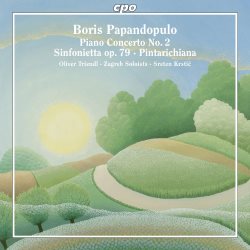|

|
Boris PAPANDOPULO (1906-1991)
Piano Concerto No. 2 (1947) [29:09]
Sinfonietta, op. 79 (1938) [28:16]
Pintarichiana (1974) [10:06]
Oliver Triendl (piano)
Zagreb Soloists/Sreten Krstić
rec. Zagreb, Small Hall of Vatroslav Lisinsky Concert Hall, 2013.
Reviewed as lossless flac.
CPO 777829-2 [67:31]
More than any other label, CPO finds composers whose names are totally unknown to all but the most knowledgeable. Boris Papandopulo was the son of a Greek nobleman and Maja Strozzi-Pečić, a Croatian opera singer. He spent much of his busy compositional career in Croatia, beginning in a nationalist folk idiom, but being drawn post-war to the avant-garde trends.
The Concerto begins with an allegro that is dominated by rhythm and scurrying strings. The piano, while very busy, simply adds some colour. There is very little in the way of melody, but your attention is maintained by the shifting patterns. Such neo-classical jauntiness leaves you unprepared for the intensity of the slow – andantino con moto – movement, which, at almost sixteen minutes in length, dominates the work. It is almost five minutes of hushed, swirling strings before the piano enters. While there are some moments of almost Romantic fortissimo, the overall mood is stark. I found it quite exceptional. The finale returns to the mood of the first, though with more emphasis on melody. The second and third movements use Croatian folk-tunes extensively, and the rhythms in the first would suggest a similar inspiration, if not direct usage.
The Sinfonietta is apparently one of the composer’s best known works and it is not difficult to see why. The opening Intrada is beautifully crafted, with delicious rhythms and pizzicato passages. The following Elegia, again the dominant movement in terms of timing, features substantial sections for solo violin, in what the informative notes describe as a Baroque da capo aria within a neo-classical framework. The closing Perpetuum mobile is filled with more scurrying passages in common with the first movement of the concerto, and a great sense of humour. My overall take is that this is a very fine composition, which deserves to be considered among the great string works of the twentieth century.
The final work, Pintarichiana, pays homage to Croatian composer and organist Fortunat Pintarić (1798–1867). It is an unashamed throwback to Viennese divertimentos of the Mozart/Haydn era, and is somewhat of an oddity in the latter stages of Papandopulo’s career, given his modernist leanings. It was written for the ensemble which plays it here.
The performances are perfectly fine, not that I had any specific point of comparison, as previous recordings are minimal, and more or less unobtainable. I find CPO’s recording occasionally a little diffuse, but not in this case, where the clarity and definition of the various string sections is excellent.
If the thought of neo-classicism with the sharp edges of Stravinsky and Prokofiev smoothed off appeals, then Papandopulo is quite a discovery.
David Barker
 |
 |
|



 All Nimbus reviews
All Nimbus reviews








